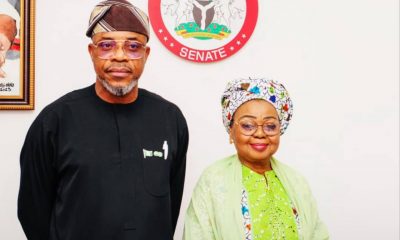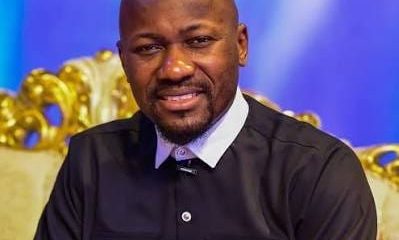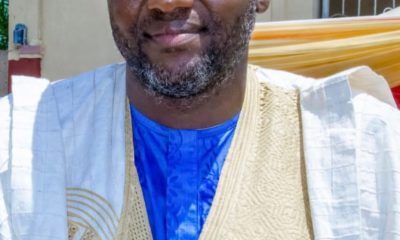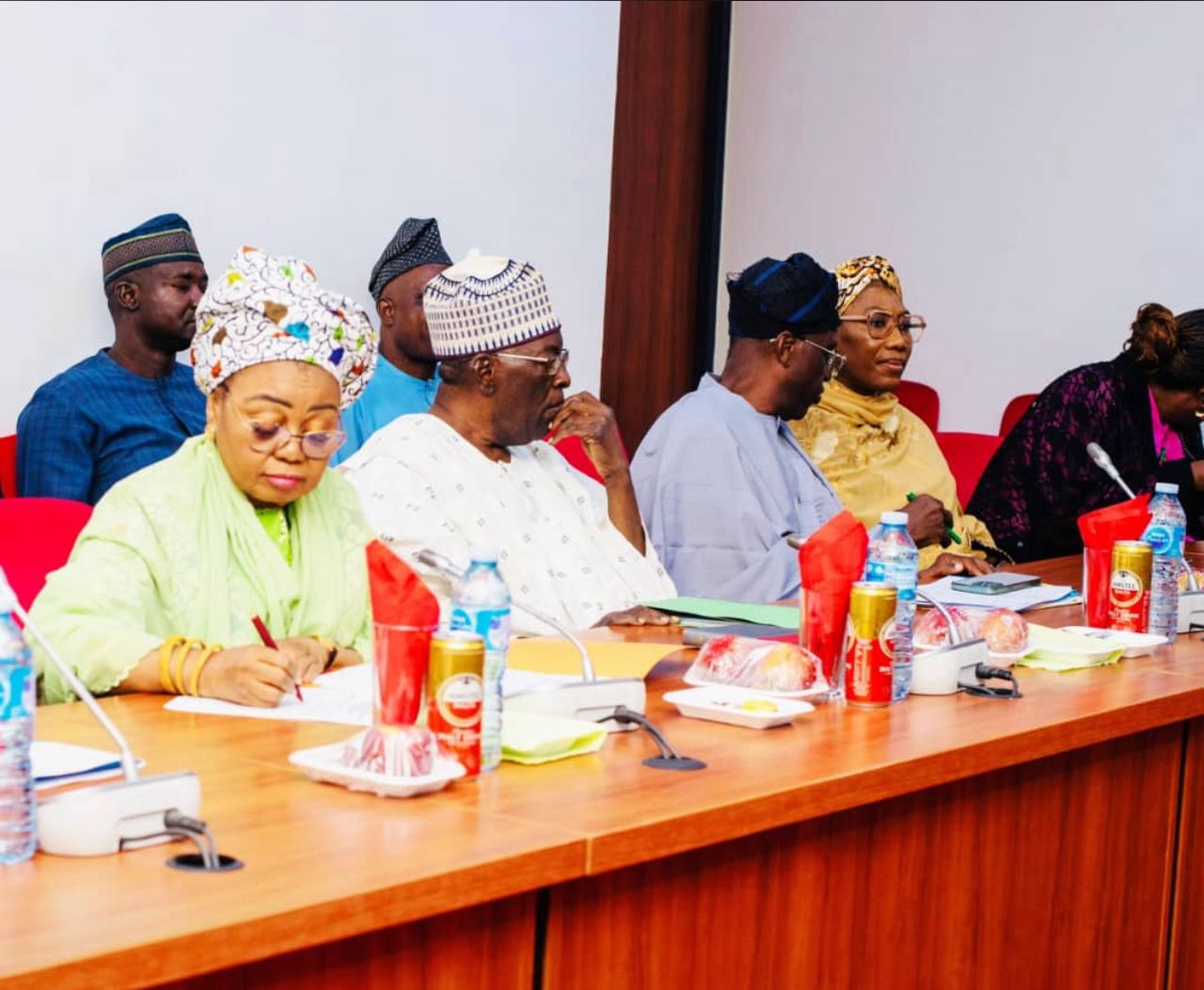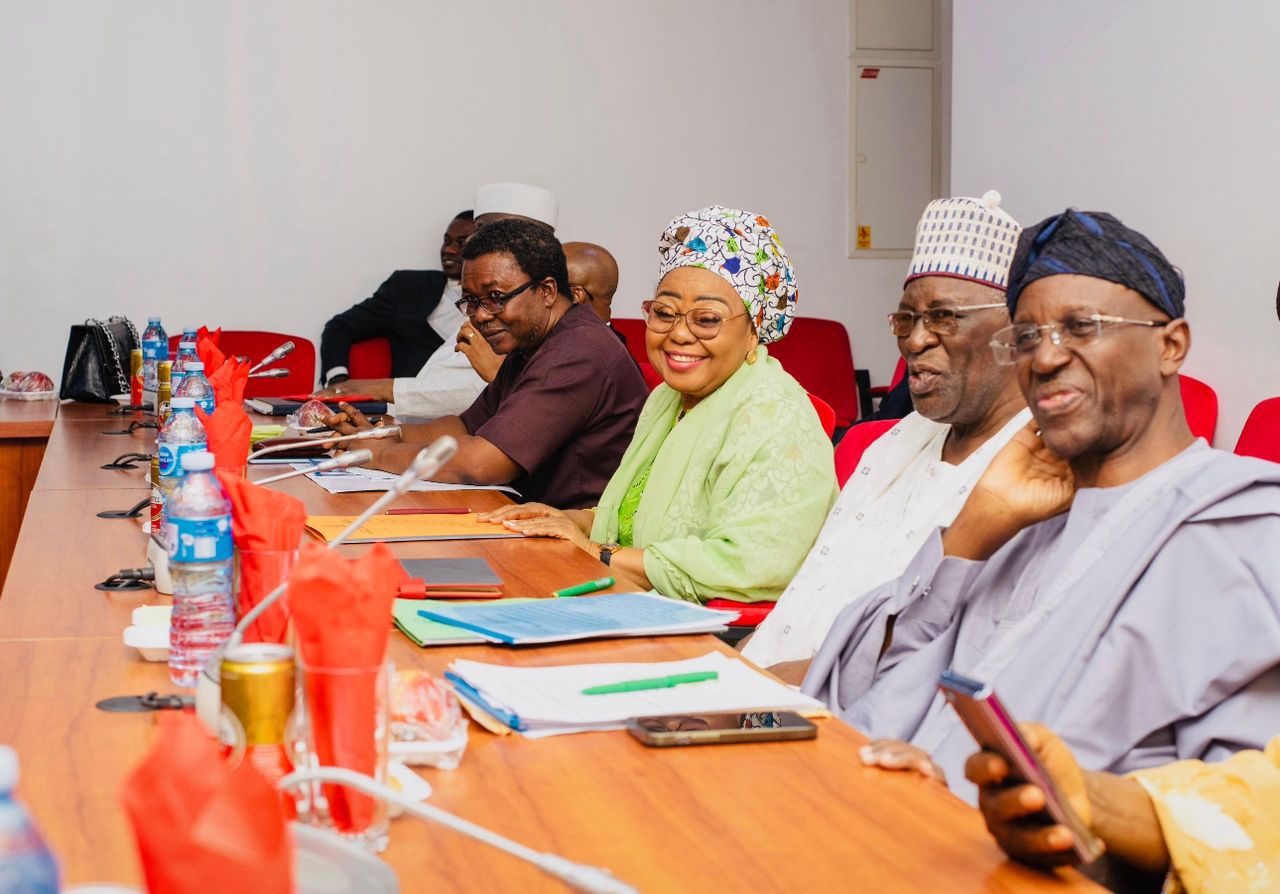society
Between the devil and the deep blue sea By Tunde Odesola
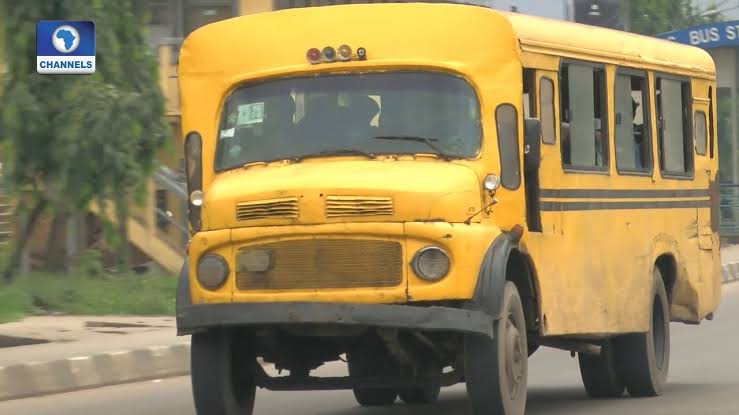
The molue is a bizarre bus. It’s a bucket of bolts with the loud noise of a helicopter. Indeed, the 49-sitting-99-standing-passenger bus is renowned in Lagos, Africa’s largest capital city, as a mobile coffin.

With the clanking sound of an engine about to knock, this particular molue, painted in green-white-green colours, jangled to a jerky stop as the driver squished the failing brake pedal to the floorboard, causing a collision of passengers against the unblunted metal edges of the shabby interior body work.
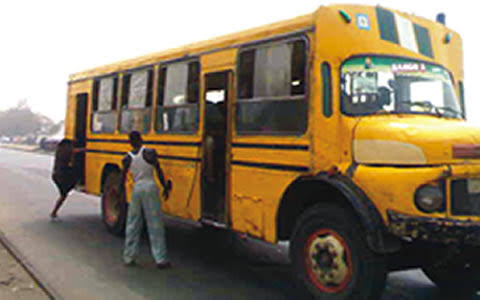
In a three-part choreographic sequence, human noise erupted from inside the molue after the deafening engine noise died down and a thick smoke enveloped the jagged metal contraption.
Cursing and coughing, Lucky, the driver of the molue, and his conductor, Sambi, were the first to emerge from the eye-peppering smoke of the bus. Swearing and sweating, passengers of the fully loaded bus emerged from within the smoke like displaced cockroaches, coughing and furious.
Purchased since 1960, this molue had not been serviced by subsequent drivers who only fed fuel to the grumpy bus despite ceaseless complaints by passengers calling for a total overhaul of the vehicle.
At different times in the accident-ridden life of this molue, subsequent negligent drivers had ignored the demand for a turnaround maintenance by passengers whose flesh, clothes and goods were daily ripped by the sharp metal edges inside the bus.
After the cloud of smoke had cleared and the black oil dripping from under the vehicle had stopped, Lucky pinched a dripping hole in a sachet of ‘Sledgehammer’ with his teeth, and in one belching gulp, drained the alcoholic content.
However, all hell broke loose when Lucky implored the passengers to go back into the bus to commence their journey to Abuja.
Lucky: Let’s go inside the bus and pray so that we can commence our journey in earnest.
Passenger 1: What kind of stupid and clueless driver is this? So, you can call for prayer after drinking ogogoro, abi? Are you supposed to call for prayer or fix your cursed bus?
Passenger 2: You kari bus komot for house, you no gauge oil, you no gauge tyre, brake no good, no whipper, no horn, no pointer, yet you collect money from us, and your motor come pafuka on top Third Mainland Bridge. Me, I no sabi swim o. I don warn you o, ehn-ehn!
Lucky: Don’t come and insult me here o. I’m not an ordinary driver, I am a graduate and I have my degrees, including a PhD. I’m here to serve the masses. So, don’t talk to me anyhow.
Sambi: (Appealing to the passengers) I’m also a graduate but I’ll speak pidgin so that everyone can understand. Na because make we no delay una for road here, das why my oga say make we pray and manage the bus to Abuja. Na small thing dey worry the bus o; na just to change the crankshaft, gearbox and carburetor, then we go make it to Abuja in 24 hours; we can still manage the brake to Abuja, my oga sabi pump failing brake well, well.
Passenger 2: You must be mad, you this stupid conductor! You want to manage faulty brakes from Lagos to Abuja, abi? It’s you that will not see 2021, you murderer!
Just then, a sparkly bus parked in front of Lucky’s shambly molue. Written boldly on it was, “Integrity Airbus.” The bus owner, Eko, came out with his garage mob, and together, they poached passengers from Lucky’s bus. A tired old man called Baba Integrity was the driver of the bus.
Eko: (Appealing to the stranded passengers on Lucky’s bus) Abuja straight! Abuja straaaaight!! No stopping for road o. Fully air-conditioned bus at affordable price. Free wi-fi, free food, maximum security of life and property, peace and enjoyment guaranteed during the journey. Abuja sttraaaaaightt! You guys know I won’t lead you astray, this bus is heading to the Promised Land straight!
(The ensuing surge for space on the bus almost led to a stampede. All the passengers, except one, abandoned Lucky’s bus and went on to board Baba’s ‘Integrity Bus’. Three passengers, Johnbull, Paine and Iya Aburo spoke freely on Integrity Bus)
Paine: Ha, see Chief Eko himself vouchsafing for this bus, it must be reliable.
Other Passengers: It must surely be.
Baba: (Speaking over the intercom) Trust me, I’m a tested and trusted driver. You know I’ve done it before. I’ll give you a trip you will live to remember for the rest of your lives.
Passengers: (Roar in applause)
Eko: You guys are very lucky Baba graciously agreed to drive you to Abuja by himself. No force in the world can stop this bus.
Paine: (Effusing joy) Yes, we sabi. Na God say make Baba show up to rescue us from the dangers on the Third Mainland Bridge and the sea under. For my life, I no go ever enter any motor driven by Lucky and his PindiPi company.
Johnbull: Na true, we all dey very lucky.
(Everyone was in amazement of the Integrity Bus – its sheen and perfect body work. But as Baba attempted to start the engine, the paints began to peel off. The engine failed to crank.)
Passengers: Haaaaa!
Paine: Wetin bi dis? Lucky’s bus still dey move small-small, dis one no even move at all. Na from frying pan to fire be dis o.
Johnbull: But why dem come build special cabin for Baba for driver seat nah? I mean, why we no fit see Baba face nah?
Eko: To drive the Integrity Bus no easy. All of us sabi Abuja road very well – armed robbers full everywhere, Boko Haram dey yanfu-yanfu, kidnappers dey berekete. So, Baba need concentration to drive and crush all the robbers, Boko Haram and kidnappers on the road.
Paine: Drive and crush Boko Haram, robbers and kidnappers at the same time? Baba na James Bond or Formula 1 driver, uhmm?
Johnbull: Abeg, wetin be di bus wi-fi password?
Garage boy: It’s not advisable to use wi-fi now because Boko Haram can use wi-fi signal to locate and blow up this bus.
Paine: Ha?! But we never even comot Third Mainland Bridge nah?
Garage boy: Yes, I know, but Boko Haram dey everywhere o.
(A baby lets out a shriek)
Garage girl: Make im mama give am breastmilk nah. Abi you no want make Baba concentrate ni?
Iya Aburo: It’s the hotness here that’s making my baby cry, not hunger. Please, switch on your full air-conditioner.
Eko: Iya Aburo, so you no sabi say air-conditioner no dey good for small pikin? Air-conditioner is a very dangerous thing o.
Johnbull: Wey the food una promise passengers?
Eko: When embarking on this type of dangerous journey, you need fasting and prayers.
Iya Aburo: Please, come and help me open the window by my seat so that my baby can get some fresh air.
Garage boy: Dat na very big security risk o; you want to expose other passengers to danger? Passengers mustn’t even touch the window blinds. Everybody should just put their trust in Baba, he’s doing a fantastic job, we are moving so fast.
Iya Aburo: But I can’t hear the sound of the engine.
Paine: I can’t hear any engine sound, too. Is this bus flying or are we not riding on Nigerian roads full of potholes?
Eko: Baba is trained to dodge potholes.
A passenger angrily yanked off the blind from the window, alas!, the vehicle hadn’t moved from the same spot it picked the passengers.
Passengers: Whaaaaat!!! Why haven’t we moved from the same spot since?
Baba: You lazy passengers can’t understand. I’m trying to make a choice between staying with the devil, that is, the Third Mainland Bridge, or plunging you into the deep blue sea below!
Passengers: Haaaaaaa!
ENDS
Email: [email protected]
Facebook: @tunde odesola
Twitter: @tunde_odesola
society
Senate Backs FCC, Says Underfunding Weakens Constitutional Mandate
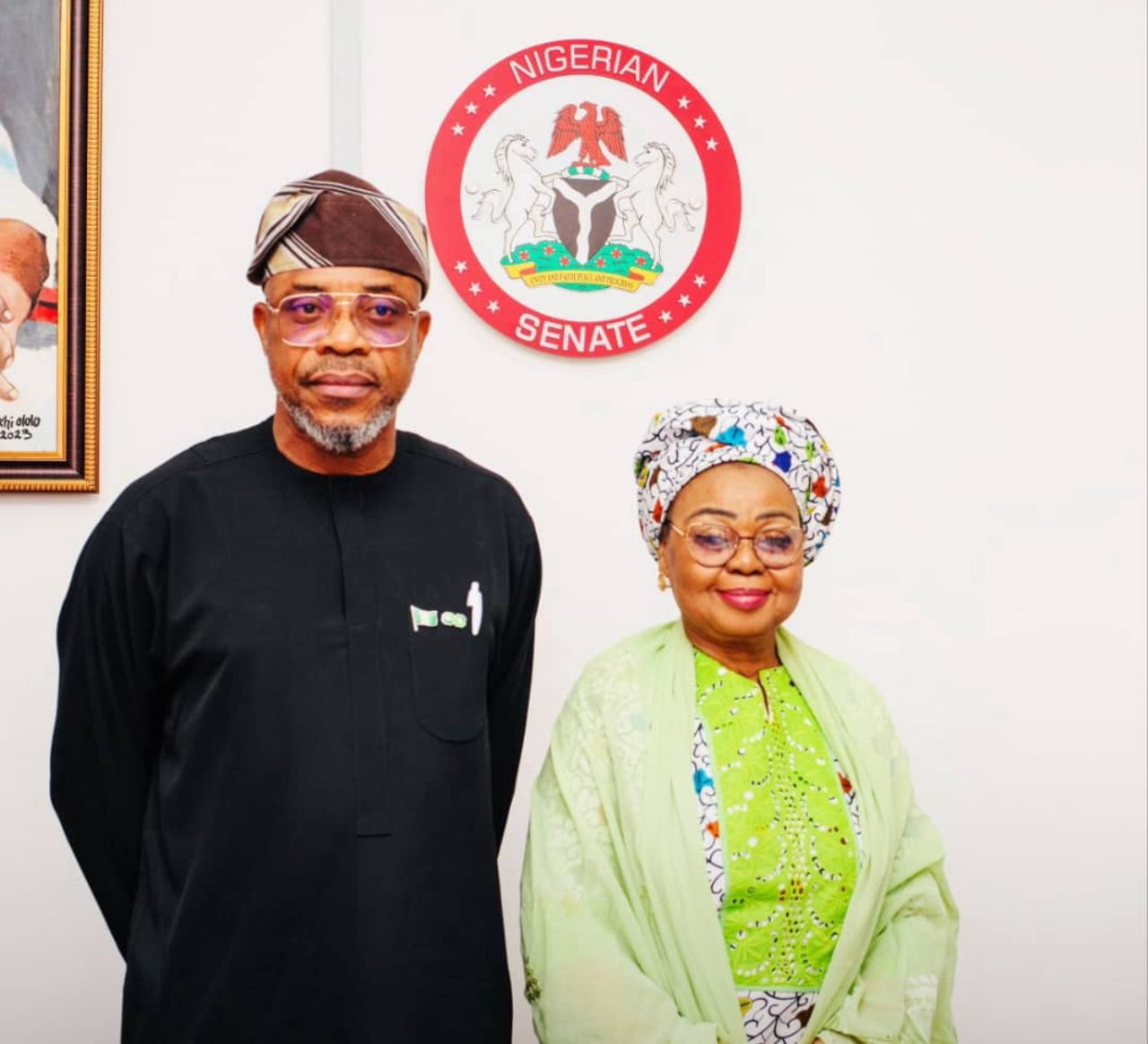
Senate Backs FCC, Says Underfunding Weakens Constitutional Mandate
The Senate Committee on Federal Character has raised serious concern over the underfunding of the Federal Character Commission (FCC), warning that it is affecting the Commission’s ability to carry out its constitutional responsibilities.
During the 2026 budget defence at the National Assembly, the Executive Chairman of the FCC, Hon. Hulayat Motunrayo Omidiran, presented a proposed budget of ₦6.5 billion and explained that limited funding has reduced the Commission’s capacity to properly monitor and enforce compliance across more than 700 Ministries, Departments and Agencies (MDAs).
She stressed that without adequate funding, the Commission cannot effectively ensure fairness, balance, and equal representation in federal appointments and public service.
“We are appealing to the Senate to support improved funding for the Commission. Federal Character is a constitutional duty, and we must be equipped to enforce it effectively for the good of national unity,” she said.
Chairman of the Senate Committee on Federal Character and Intergovernmental Affairs, Senator Allwell Heacho, described the funding gap as a serious setback.
“Federal Character is not optional. It is backed by the Constitution. The Commission responsible for enforcing it must be properly funded to deliver,” he stated.
He assured that the Senate Committee is committed to supporting the FCC to strengthen its operations and improve accountability across government institutions.
With support now coming from both the Senate and House Committees, the FCC is set to push for stronger enforcement and better service delivery nationwide
society
Apostle Suleman Lectures: Your Association Determines Your Acceleration; If You’re Gifted, You’ll Stand Out
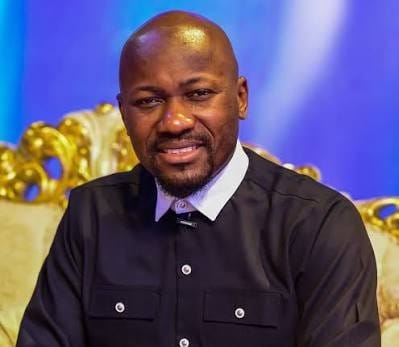
Apostle Suleman Lectures:
Your Association Determines Your Acceleration; If You’re Gifted, You’ll Stand Out
Gifted people are always different. They stand out and never fit in because God uses them in a greater way, the servant of God and founder of the Omega Fire Ministries (OFM) worldwide, Apostle Johnson Suleman, lectures. Speaking about gifts, in particular, spiritual gifts, the ‘Restoration Apostle’ noted that every man is gifted by God. He stated in his sermon that gifts are the result of the finished work of Jesus Christ on the cross.
While suggesting that where a man is most gifted is where he will be most lifted, Apostle Suleman declares that, to stand out in one’s generation, the person must be gifted.
“To be gifted is to be specifically empowered. To be gifted is to be supernaturally assisted to fulfil a task. Many of us are praying for helpers, but you cannot stand before helpers without anything to offer. A man’s gift maketh room. The more gifted you are, the more rooms you have (Proverbs 18:16). Man’s gift maketh rooms for him and bringeth him before great men. No Joseph appears before a Pharaoh until he has capacity to interpret his dreams. The king sent for Daniel because there was a gift in his life. He stood out because there was a gift he had. The problem is not getting helpers, when you have a gift, helpers will look for you. What is your gift?
Apostle Suleman asserts that every man possesses inherent, distinct gifts that are designed to be developed and deployed for a specific purpose. However, he emphasizes, identifying one’s unique gift or purpose requires a defining moment, experience, or interaction rather than just passive introspection, designed to unlock potentials that have been dormant.
“There is nobody that is not gifted. Everyone is equally gifted but it takes an encounter to discover your gift. The gift can be there, hidden but it takes an encounter to discover it. The Bible says Saul was met by Samuel and Samuel took a vial of oil and anointed Saul and said is it not because the Lord hath ordained thee to be captain over the people of God (1 Samuel 10:1). Saul was not a king of Israel, he was a captain. That is why his son, Jonathan could not step into the stool because kingship is by inheritance, but captain-ship is by appointment. So, when Saul met the prophet he began to prophesy. It takes meeting a man to enter the next season. Season is not a bait, it is a man. It takes meeting the right man. The second thing that empowered Saul to stand out was that he joined the right team; Shadrach, Meshach, and Abednego.
Highlighting that the people a man surrounds himself with, learn from, and follow, directly influence the speed and success of his life’s progress, the man of God submits that positive associations can accelerate man’s destiny, while negative associations can drive stagnation, delays, and limitations.
“Your association determines your acceleration. If you’re with the wrong people, you will get the wrong experiences. It is very important. Blessed is the man that walks not in the counsel of the ungodly. Nor stand in the way of sinners, nor sit in company with scoffers. (Psalm 1:1,2,3). You start by walking with them. If you keep walking with them, you’ll soon stand with them. When you stand with them, you’ll sit with them. You must be extremely picky in your relationship. There are some people that should be made to know, because they’re not aware that they’re not your friends. They assume they are your friends but you have to let them know that you are colleagues not friends. You have to be very intentional because friends either add, subtract, divide or minus. You can’t have a friend who’s playing neutrality.
In your walk with God, when the enemy wants to destroy you he will introduce you to a strange company. Any company that kills your fear of God is a wrong company. The right company will make you think of heaven. A right company will want to make you live clean, pure and right. The right company will make you God-conscious. The right company is family-oriented. A right company will make sure you avoid conflicts. A right company will promote God not greed,” he counsels.
society
Ooni’s Ojaja Pan Africa redeems ₦9.2Billion SEC Regulated Public Debt Market, commits to economic stability
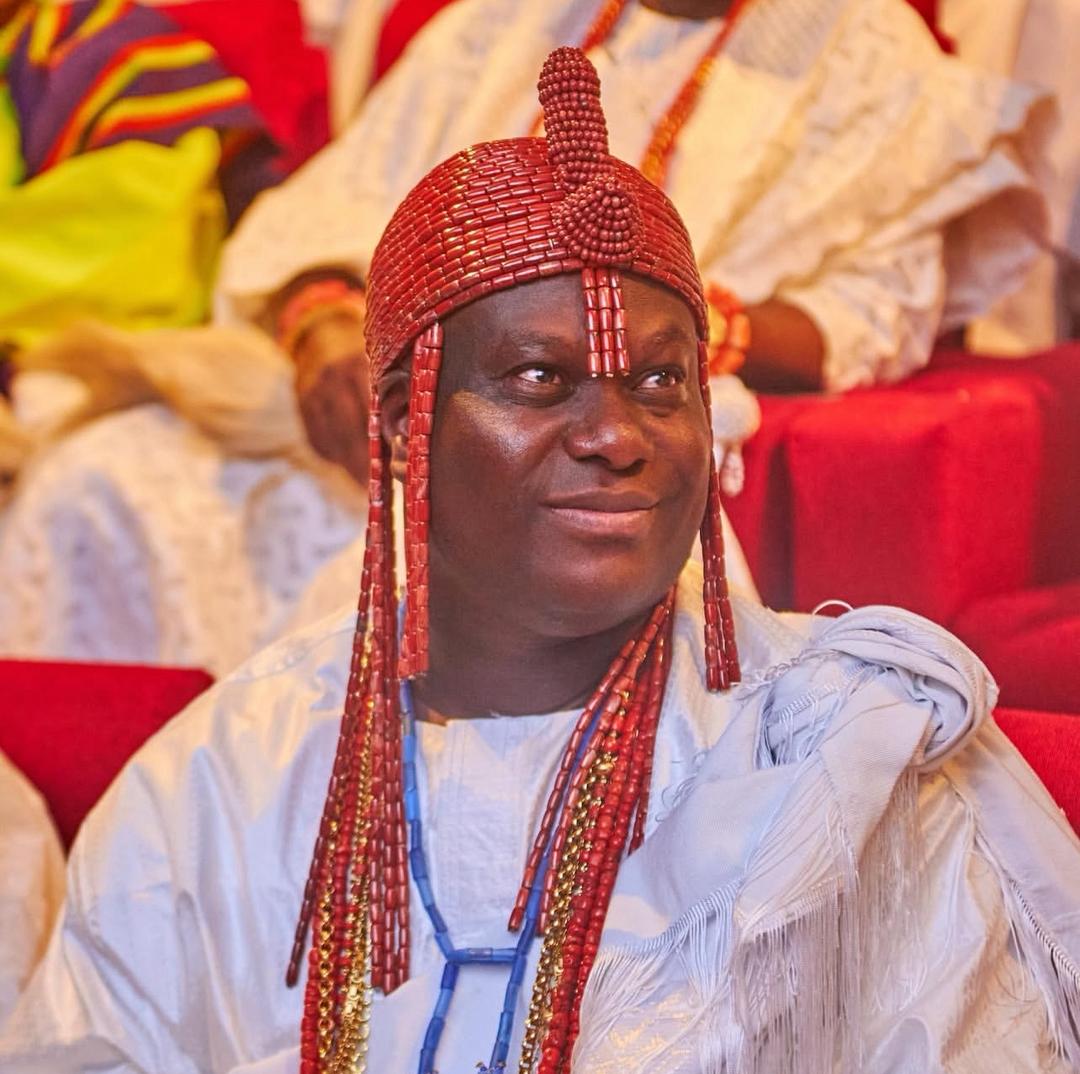
Ooni’s Ojaja Pan Africa redeems ₦9.2Billion SEC Regulated Public Debt Market, commits to economic stability
The Ojaja Pan Africa Limited owned by, His Imperial Majesty, Ooni Adeyeye Enitan Ogunwusi, Ojaja II, CFR, the Ooni of Ife, recently completed the seamless redemption of its inaugural Commercial Paper (CP) issuance, amounting to an impressive ₦9.2 billion. This achievement sends a powerful message about Ojaja Pan Africa’s strong liquidity and unwavering creditworthiness, making waves throughout Nigeria’s financial landscape.
The funds were raised as part of a duly registered ₦10 billion programme on the FMDQ Securities Exchange. Ojaja Pan Africa fulfilled its entire obligation with remarkable efficiency, fully repaying ₦2.15 billion from Series 1, maturing on 21 November 2025, and ₦6.91 billion from Series 2, maturing on 20 February 2026, utilizing resources generated internally. This accomplishment is especially noteworthy against the backdrop of Nigeria’s challenging economic environment, where the Central Bank’s Monetary Policy Rate currently stands at a high 27 percent, rendering short-term borrowing prohibitively expensive for many corporations.
“The timely redemption of our Series 2 Commercial Paper, following the successful repayment of our maiden Series 1, stands as a powerful testament to the stability of Ojaja Pan Africa’s balance sheet and the rigor of our financial planning,” expressed Dr. Ayobami Oyedare, Acting Managing Director of Ojaja Pan Africa Limited. “By meeting these obligations in full, we have validated the trust placed in us by the investing public. With both maturities now successfully resolved, we are strategically focused on leveraging the remaining resources from our ₦10 billion programme to foster significant growth and expansion opportunities across the continent.”
The successful issuance and redemption were expertly handled by Comercio Partners Capital Limited, who acted as Lead Financial Advisers and Arranger. Mr. Stephen Osho, CEO of Comercio Partners, described the transaction as a defining moment for Ojaja Pan Africa. “The flawless execution of this redemption underscores the company’s exceptional operational capabilities and solid balance sheet integrity in the marketplace. Achieving this success amidst the intense pressures of the current economic tightening cycle illustrates the company’s capacity to not only weather challenges but to thrive in such conditions.”
This financial milestone represents just one chapter in Ooni Ogunwusi’s broader narrative of nation-building and economic innovation. Far from a mere ceremonial figurehead, the Ooni is a dynamic visionary with over 25 years of entrepreneurial acumen. As the Chairman and Group Chief Executive of Ojaja Pan Africa, he has transformed the conglomerate into an economic powerhouse, creating opportunities for tens of thousands of individuals across Nigeria while actively pursuing expansion initiatives throughout Africa. The company’s diverse portfolio exemplifies a blueprint for modern African economic development, encompassing ventures in real estate, hospitality, agriculture, education, manufacturing, and tourism.
Ooni Ogunwusi’s industrial vision is actively reshaping Nigeria’s economic canvas. In a landmark move for the country’s tourism industry, he signed a Memorandum of Understanding with the Nigerian Tourism Development Authority (NTDA) in February 2026, earning him the distinguished title of Grand Patron of Tourism. Through Ojaja Pan Africa, he is channeling private capital, leveraging diaspora networks, and utilizing cultural expertise to enhance heritage sites, cuisine, and hospitality infrastructure, all aimed at diversifying Nigeria’s economy away from oil dependency and positioning the nation as a premier global cultural destination.
A prime example of his innovative philosophy is the recent launch of OJAJA Soft Drinks, a proudly Nigerian beverage line crafted entirely from local, natural ingredients such as kola nut, ginger, lime, and lemon, along with an array of indigenous flavors. Designed to offer a healthier alternative to imported beverage giants, this brand not only empowers local farmers but also creates sustainable value chains for young entrepreneurs, vigorously pursuing the goal of import substitution. “It has always been my dream to build a powerful brand that embodies the essence of Africa, one that emerges from our vibrant continent and secures a prominent position on the global stage. My passion for educational excellence inspired me to establish Ojaja University in both Ilorin and Ile-Ife, with the aim of enhancing the quality of education and empowering the next generation of entrepreneurs.”Ooni Adeyeye declared.
Ooni further reemphasised his huge commitment to agricultural development using it as a tool for youth empowerment and development. He created the in and out growers scheme to enhance the youth cocoa revolution Eight years ago. “I personally gave three million cocoa seedlings to youths scattered across the country to help them expand their horizon and also rejig their interest in farming as a tool for development and economic stability. Today, those youths are reaping the rewards of their hard work with bountiful harvest.” Ooni further stressed that his focus for the youth is not merely on cultivating cocoa; but he is more dedicated to reshaping the industry by prioritizing local production over the export of raw cocoa beans. “By processing these beans domestically, we aim to create jobs for more youths and conserve foreign exchange for Nigeria, particularly in the chocolate and beverage markets. These impactful initiatives have garnered significant attention, with coverage from respected media outlets such as CNN and Al Jazeera.” We are not just cultivating cocoa; we are sowing the seeds for a sustainable future for our youth, one that showcases the rich potential of our continent to the world.” Ooni said.
The vision of a self-sufficient, industrious Nigeria is vividly manifested at Ojaja Mall, the largest and most innovative shopping destination in the country. Located in Lekki, Lagos, this massive AI-powered commercial hub features world-class retail arcades, modern cinema experiences, office spaces, an MSME centre, and various entertainment zones. Officially opened with grand celebrations, this landmark project is already generating thousands of direct and indirect jobs, invigorating local commerce, and setting a new standard for smart retail in Africa.
From championing Made-in-Nigeria products within his palace to facilitating youth empowerment initiatives through the House of Oduduwa Foundation, Oba Adeyeye Enitan Ogunwusi is committed to the principles of unity and progress. He is a staunch advocate for collective contributions to national development, regularly blessing the land for peace and prosperity, and fostering a vision of a transformed Nigeria driven by innovation, resilience, and entrepreneurial spirit.
-

 celebrity radar - gossips6 months ago
celebrity radar - gossips6 months agoWhy Babangida’s Hilltop Home Became Nigeria’s Political “Mecca”
-

 society5 months ago
society5 months agoReligion: Africa’s Oldest Weapon of Enslavement and the Forgotten Truth
-

 society6 months ago
society6 months agoPower is a Loan, Not a Possession: The Sacred Duty of Planting People
-

 news6 months ago
news6 months agoTHE APPOINTMENT OF WASIU AYINDE BY THE FEDERAL GOVERNMENT AS AN AMBASSADOR SOUNDS EMBARRASSING


